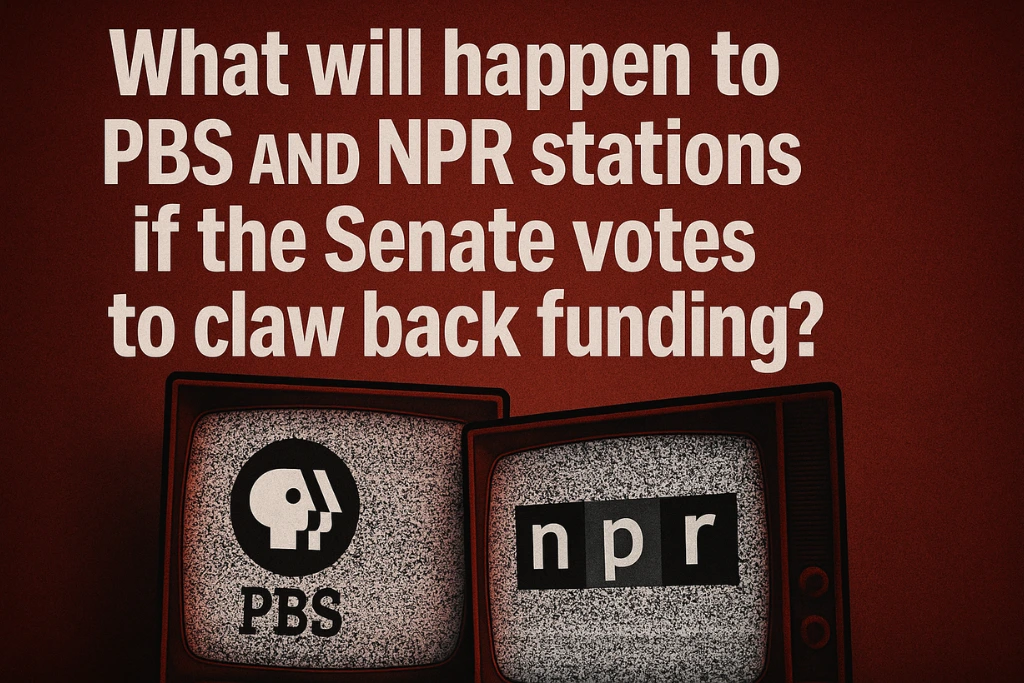PBS and NPR could lose $1.1B in federal support if the Senate votes to rescind funding. Here’s what that means for public media, rural stations, and your favorite programs.
Table of Contents
📰 Overview
PBS and NPR stations are facing an existential threat as the Senate prepares to vote on a rare budgetary move known as a rescission. The proposal would claw back $1.1 billion in funding that has long been the backbone of America’s public media ecosystem.
If approved, this decision could reshape how millions of Americans access educational TV shows, local journalism, and emergency broadcasts—especially in rural areas.
🔥 Why This Matters
- What’s at stake? The funding cut targets the Corporation for Public Broadcasting (CPB), which distributes federal dollars to over 1,500 local radio and TV stations across the country.
- Who depends on it? Rural and economically distressed communities rely heavily on federal support to keep their stations on air.
- Timeline: If passed, the cuts would take effect October 2025–September 2027, leaving many stations scrambling to fill budget gaps.
🎙 What Viewers & Listeners Could Notice
✅ Fewer local programs: Stations may have to reduce their news coverage and educational programming.
✅ Layoffs looming: Some public media executives are already preparing for staff cuts.
✅ Rural areas hardest hit: Small stations could shut down entirely without federal support.
📺 Will Popular Shows Disappear?
Not immediately. Beloved programs like Daniel Tiger’s Neighborhood or Morning Edition will remain for now, but reduced budgets could lead to fewer new shows and less diverse programming in the long term.
“Without PBS, I couldn’t have made any of my documentaries,” filmmaker Ken Burns recently told CBS.
⚖️ The Political Battle
- Republicans’ stance: Many argue taxpayer-funded media is unnecessary in the streaming era and accuse NPR and PBS of political bias.
- Democrats’ response: They say cutting funds threatens millions of Americans who rely on public broadcasting for critical news and emergency alerts.
Senator Bernie Sanders called the move “an attempt to silence objective reporting,” while Senator Susan Collins labeled the cuts “excessive” but supported defunding NPR at the national level.
🧭 What Happens Next?
If federal funds are rescinded:
- Big-city stations: Likely to survive through donor campaigns.
- Small-town stations: May go dark, losing vital community connections.
- National networks: NPR and PBS could face a domino effect as member station fees dry up.
📌 Final Take
The Senate vote on PBS and NPR funding is about more than just budgets—it’s about the future of public media in the U.S. Whether the networks adapt or falter will depend on the outcome of this high-stakes political fight.
📌 Must Read
📌 Must Read = Nvidia to Restart AI Chip Sales to China After U.S. Export Reversal
📌 Must Read = Goldman Sachs Q2: $840M Trading Beat Lifts EPS to $10.91
📌 Must Read = US Probes Brazil’s Trade Practices in Section 301 Case
✅ FAQs
1️⃣ Why is PBS and NPR funding at risk?
The U.S. Senate is voting on a rescission measure to claw back $1.1 billion in federal funding for public media, including PBS and NPR, which could force budget cuts and closures for many local stations.
2️⃣ How much federal funding does PBS and NPR receive?
PBS and NPR are supported through the Corporation for Public Broadcasting (CPB), which receives $535 million annually to distribute to about 1,500 local TV and radio stations.
3️⃣ What happens if CPB loses its budget?
If CPB’s funding is rescinded, smaller public media stations, especially in rural areas, could shut down. Larger stations may survive through donations, but they’ll face reduced programming budgets.
4️⃣ Are rural stations more affected by funding cuts?
Yes. Rural and economically distressed communities rely heavily on federal support, and many small stations cannot operate without it.
5️⃣ Why do Republicans want to cut public media funds?
Some Republicans argue public media is outdated in the streaming era and accuse NPR and PBS of political bias. Others say federal support for media is not outlined in the U.S. Constitution.
